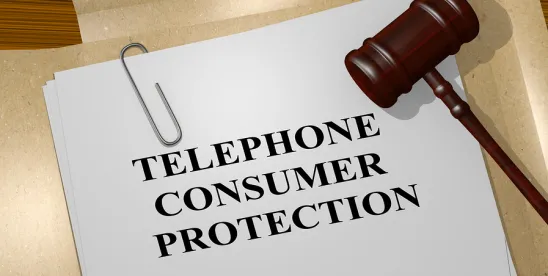Key Takeaways:
- Companies sued for Telephone Consumer Protection Act (TCPA) violations should consider challenging the allegations at the outset by moving to dismiss, rather than conceding based on out-of-date precedent and answering the complaint.
- The TCPA is in a particularly volatile state as more courts are beginning to see merit in challenges to Federal Communications Commission (FCC) Orders. These changes follow the Supreme Court’s rulings in Loper Bright and McLaughlin,and the Eleventh Circuit’s ruling striking down the FCC’s proposed “one-to-one consent” rule, holding that the FCC had exceeded its statutory authority by imposing additional restrictions that were not supported by the TCPA’s text. Ins. Mktg. Coalition Ltd. v. Fed. Commun. Comm’n, 127 F.4th 303 (11th Cir. 2025).
- These rulings suggest further vulnerability of FCC interpretations of the TCPA, including the FCC’s rulings that “express consent” means “written consent” and that intermediate telephone carriers might be liable for “making” calls.
- A split has developed among district courts in Oregon and Illinois with respect to how the TCPA applies to text messages, so while defendants might be emboldened to challenge text-related TCPA claims, there is no guarantee these challenges will be successful. Best practices regarding compliance with the TCPA should remain the same.
The Case
On July 21, 2025, the U.S. District Court for the Central District of Illinois dismissed a TCPA class action, finding that text messages were not “telephone calls” and therefore not subject to the TCPA’s Do-Not-Call (DNC) requirements. The opinion, Jones, et al. v. Blackstone,Case No. 1:24-cv-01074, 2025 WL 2042764 (C.D. Ill. July 21, 2025), analyzed claims against Blackstone Medical Services, LLC for its “aggressive telemarketing campaign” wherein plaintiffs alleged they received “a barrage of text messages” after repeatedly messaging Blackstone to “STOP.” The complaint purported to bring claims on behalf of three classes: (1) those who had been listed on the National Do Not Call Registry, (2) those who had individually requested Blackstone stop calling/texting, and (3) Florida residents protected by the Florida Telephone Solicitation Act (FTSA). Due to the plaintiffs’ reliance on “violative text messages,” the court granted Blackstone’s 12(b)(6) motion and dismissed the entire complaint without prejudice, finding the plaintiffs had failed to state a claim.
McLaughlin’s Impact
This ruling—which disagreed with the plaintiff’s attempt to rely on prior FCC orders —is in line with the U.S. Supreme Court’s decision earlier this summer, in McLaughlin Chiropractic Associates v. McKesson Corporation,where the Supreme Court held that district courts are not bound by final FCC Orders. McLaughlin looked to last years’ Loper Bright Enterprises v. Raimondoopinion, overturning Chevron-deference, to find that “[d]istrict courts are not bound by the agency’s interpretation but instead must determine the meaning of the law under ordinary principles of statutory interpretation, affording appropriate respect to the agency's interpretation.” 145 S. Ct. 2006, 2015 (2025). The Blackstone court, in employing these ordinary principles of statutory interpretation, found the “plain meaning” of Section 277(c) of the TCPA to exclude text messages. 2025 WL 2042764 at *4.
The Blackstone Court’s Analysis
Although the plaintiffs cited a series of FCC Orders from 2003 to 2016 to support their theory that the text messages at issue were actionable under the TCPA, the court was unpersuaded. The court first determined that the referenced FCC Orders only explicitly referred to Section 227(b) of the TCPA, not the DNC laws at issue under Section 227(c). Id.With this in mind, the court noted that, even factoring in the FCC’s expertise, an interpretation of Section 227(c) to include “text messages” still would not be the most accurate interpretation of the TCPA. Id.at *5. The court relied upon the Supreme Court’s recent opinions in McLaughlin and Loper Bright, explaining that it would not be bound by the FCC’s interpretation of the law even if the FCC had intended to apply the TCPA’s DNC requirements to text messages and citing its obligation to “start with the text of the statute to ascertain its plain meaning.” Id. at *4.
The opinion, authored by District Judge Jonathan E. Hawley, reasoned that “‘only ‘call’, ‘telephone call’, and ‘artificial or prerecorded-voice telephone call’ appear in Section 227(c) and its implementing regulations,” while the law “remains silent as to text messages.” Id.at *3-*4. The court also explained that, because text messaging technology was not available in 1991, the statute’s drafters could not have intended to include “texts” within the definition of “telephone call.” Id. The court concluded that “[i]t is not for a court to legislate by reading into the TCPA something that is not there,” and dismissed each of the TCPA claims. While a single claim under the Florida state law equivalent to the TCPA, the FTSA, remained, the court declined to exercise supplemental jurisdiction and dismissed the entire complaint.
Not All Courts Agree
Prior to Blackstone, the prevailing view among federal courts was that Section 227(c) applied to text messages. Blackstone marks one of the first major changes to TCPA precedent in light of the Supreme Court’s opinion in McLaughlin.
However, not all courts are abandoning the position that texts are encompassed by the TCPA’s DNC requirements. On the very same day the Blackstone opinion came out, the U.S. District Court for the District of Oregon reached the opposite conclusion: “The cause of action provided in § 227(c)(5) includes text messages.” Wilson, et al. v. Skopos Financial, LLC d/b/a Reprise Financial, Case No. 6:25-CV-00376-MC, 2025 WL 2029274, at *4 (D. Or. July 21, 2025). That court looked favorably upon the FCC’s regulations and guidance, finding them “congruent with Congress’s overarching goals for the TCPA.” Id.
Thus, while it is possible that some courts may reconsider older TCPA precedent regarding text messages, other courts may double down on pre-McLaughlin guidance and case law. TCPA litigants will likely pay close attention to how this split among courts develops moving forward, as the viability of such claims may hinge on the jurisdiction in which the action is brought.
Conclusion
With the TCPA in a state of flux, defendants might be encouraged to challenge more TCPA allegations at the motion to dismiss stage, rather than later in the litigation process. Other FCC interpretations of the TCPA that were previously generally accepted by courts may be rejected in the future and replaced with a more strictly textual interpretation of the TCPA. However, since courts disagree, the best practices regarding TCPA compliance should remain the same for now.






 />i
/>i

